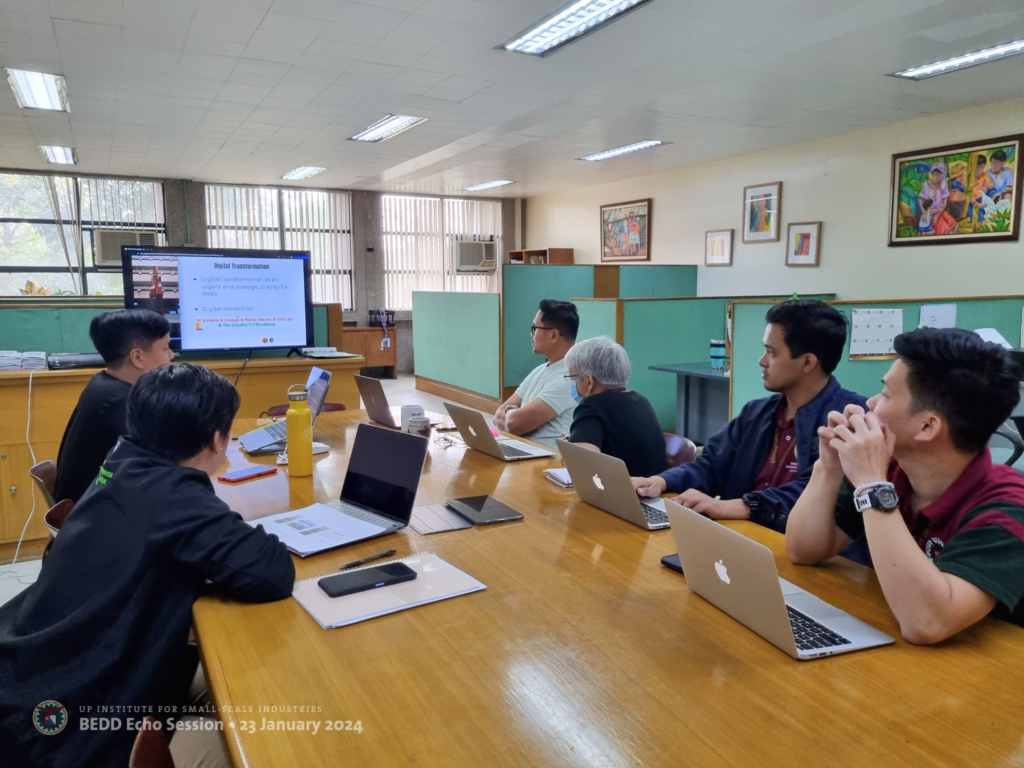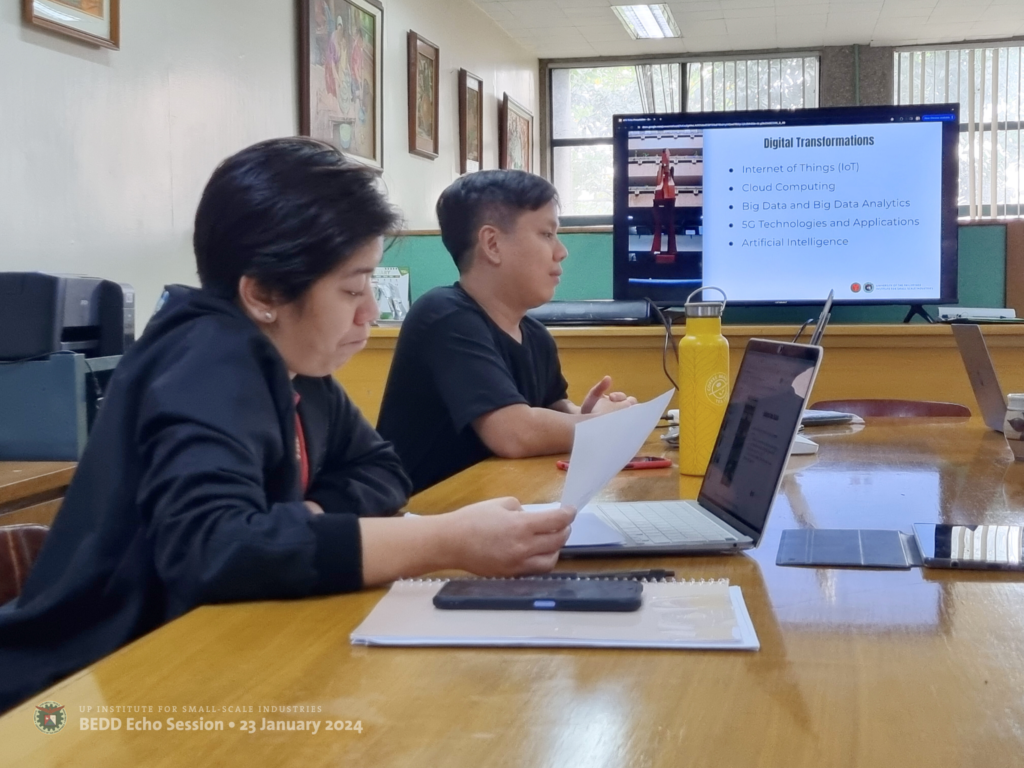ISSI staff return to enterprise division with insights acquired from APO trainings

ISSI-BEDD staff convene for an echo session by APO trainees.
Staff members of UP ISSI’s Business Enterprise Development Division (BEDD) successfully completed the program offerings of the Asian Productivity Organization last year. Ms. Karen Kay C. Bravo-Coballes (University Extension Specialist II) and Mr. Joshua V. Garcia (University Extension Specialist II) represented the division in the online training course Productivity Measurement for Digitalized SMEs (PMDS) held on August 1-4, while Dr. Reynold Ferdinand G. Manegdeg (University Extension Specialist V) participated in an in-person Conference on Tourism 4.0 for Rural Development (CT4RD) held on November 8-9 in Jakarta, Indonesia.

Ms. Bravo-Coballes and Mr. Garcia synthesize their learning sessions from PMDS online course.
Ms. Bravo-Coballes and Mr. Garcia joined 29 other participants in the online course PMDS organized by the Korea Productivity Center and APO Secretariat. Throughout the input sessions, participants were able to learn about productivity measurement, integration of digital transformation in SMEs’ strategic priorities, and utilization of information systems for measuring productivity in the digital workplace. These sessions were led by faculty members and government officers from Singapore, South Korea, and Turkiye. The program culminated with trainees presenting their insights on the priorities SMEs must focus on to embark a successful digital transformation journey.

Dr. Manegdeg explains his plans for integrating Tourism 4.0 in science-based farm tourism sites.
Meanwhile, Dr. Manegdeg joined the representatives of other APO member-countries in CT4RD organized by Indonesia’s Ministry of Village, Development of Disadvantaged Region, and Transmigration (MVDDR) and Ministry of Manpower (MoM). The conference covered topics such as Tourism 4.0, smart rural tourism, and links of Tourism 4.0 to UN SDGs; discussions on the said topics were led by faculty members, government officers, and private practitioners from Indonesia, Malaysia, Saudi Arabia, and Slovenia.
One of the successful initiatives shared during the learning session was Thailand’s Designated Areas for Sustainable Tourism Administration (DASTA), which integrates the front stage (e.g. marketing and public relations) and backstage (e.g. destination development, tourism value chains, policy formulation, etc.) of community-based tourism. Other ASEAN smart tourism projects featured in the conference include Singapore’s Digital Innovation Lab, Vietnam’s Digitization Program in Na Su Community Tourism Village, and Malaysia’s Sharing Economy Accommodation Pilot Project.
APO trainees from BEDD wrapped up their experience by conducting an echo session with the rest of the division, where they synthesized the main highlights of their learning activities. They emphasized the following topics during the echo session:
Productivity Measurement for Digitalized SMEs
- Importance of digital transformation to SMEs
- Ways to measure productivity improvement
- Ways to gain competitive advantage
- Ways to measure productivity improvement through information systems
Conference on Tourism 4.0 for Rural Development
- Introduction to smart tourism
- Case studies of benchmarked ASEAN countries
- Tourism Cluster Framework
- Developing Rural Tourism Micro-clusters
During the said session, Ms. Bravo-Coballes and Mr. Garcia also proposed digital transformation initiatives for BEDD such as creating a knowledge management portal and digitizing the division’s file archives. Dr. Manegdeg, on the other hand, saw the potential application of Tourism 4.0 (in particular the tourism cluster framework) in the development of science-based farm tourism sites.
About APO
The Asian Productivity Organization (APO) is an intergovernmental organization established in 1961 to increase productivity and sustainable socioeconomic development in the Asia-Pacific region through policy advisory services, acting as a think tank, and undertaking smart initiatives in the industry, agriculture, service, and public sectors. The APO is comprised of 21 economies, including Bangladesh, Cambodia, the Republic of China, Fiji, Hong Kong, India, Indonesia, the Islamic Republic of Iran, Japan, the Republic of Korea, Lao PDR, Malaysia, Mongolia, Nepal, Pakistan, the Philippines, Singapore, Sri Lanka, Thailand, Turkiye, and Vietnam.